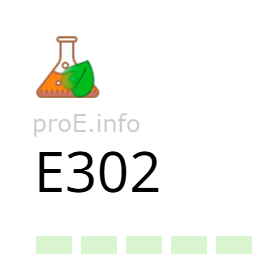
Other names for the additive (synonyms)
General Information
Food additive E302 — calcium ascorbate — is the calcium salt of ascorbic acid (vitamin C). It belongs to the group of antioxidants and acidity regulators, and it can also be used as a source of calcium in foods and dietary supplements.
In nature, calcium ascorbate does not occur in its pure form. However, its precursor, ascorbic acid, is found in many fresh fruits and vegetables (citrus fruits, rosehips, black currants, kiwi, tomatoes, bell peppers).
Calcium ascorbate was developed and patented in the 20th century as a more stable form of vitamin C, suitable for use in the pharmaceutical and food industries. Its invention was linked to the need to reduce the acidity of pure ascorbic acid and minimize its irritating effects on the gastric mucosa.
Industrially, additive E302 is produced synthetically through the neutralization of ascorbic acid with calcium carbonate or calcium hydroxide. The result is a stable salt widely used as an antioxidant additive in the food industry.
The chemical formula of additive E302 is C12H14CaO12. It appears as a white or slightly yellowish crystalline powder, odorless and highly soluble in water. It has a mild salty-sour taste and differs from pure ascorbic acid in its greater resistance to light and heat.
Effects on the Body
Benefits of Additive E302
Since additive E302 is a derivative of vitamin C, it retains similar biological properties. Calcium ascorbate contributes to collagen synthesis, strengthens connective and bone tissues, improves iron absorption, and supports immune system function.
Compared to pure ascorbic acid, additive E302 is less irritating to the gastrointestinal tract, making it a common choice in vitamin complexes and pharmaceuticals intended for individuals with high gastric acidity.
Another benefit is that calcium ascorbate has high bioavailability and also serves as a source of calcium, which may help maintain healthy bones and teeth.
Risks of Additive E302
Overall, additive E302 is considered safe. According to the EFSA, it is not necessary to establish an Acceptable Daily Intake (ADI) for ascorbic acid and its salts, including calcium ascorbate, since they pose no health risks at typical intake levels.
However, excessive consumption of additive E302 can lead to side effects similar to vitamin C overdose: diarrhea, abdominal pain, increased gas, and urinary tract irritation. In rare cases, kidney stone formation may occur in predisposed individuals.
According to JECFA, calcium ascorbate has no carcinogenic or mutagenic properties. The FDA classifies it as Generally Recognized as Safe (GRAS). Therefore, when consumed within reasonable limits, the risks are minimal.
Uses
Additive E302 is primarily used in the food industry as an antioxidant. It prevents the oxidation of fats, vitamins, and pigments, thereby extending product shelf life and preserving color and flavor. As an acidity regulator, it also helps stabilize the pH of foods.
The additive is widely used in meat products (sausages, ham), canned goods, bakery and confectionery items, beverages, and baby food. In the meat industry, it is used to maintain the red color of products and prevent graying.
In pharmacology and nutrition, calcium ascorbate is included in vitamin complexes, supplements for preventing vitamin deficiencies, and products aimed at supporting immunity.
Legal Status
Additive E302 is approved for use in the food industry in the European Union, Ukraine, Russia, the United States, Canada, Japan, and many other countries.
In the EU, the use of additive E302 is regulated by Regulation No 1333/2008 and the specifications set in EU Regulation No 231/2012, which establish strict purity criteria for calcium ascorbate. EFSA has not set an ADI, considering the substance safe. The same opinion is shared by JECFA and the FDA.